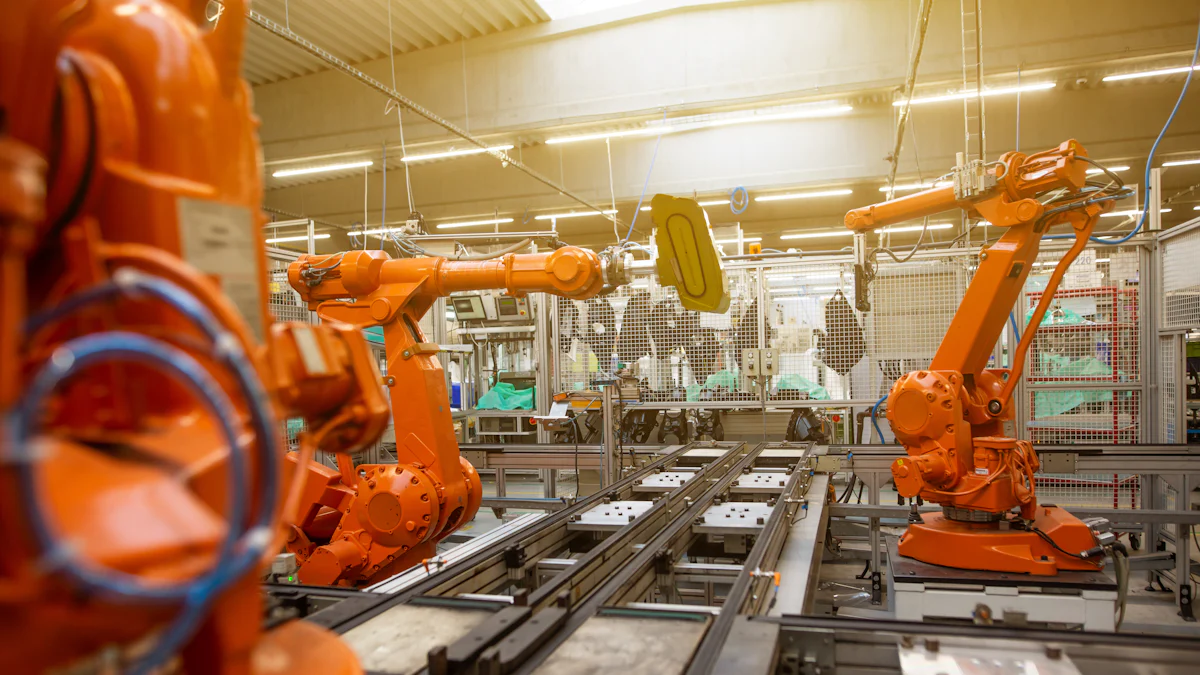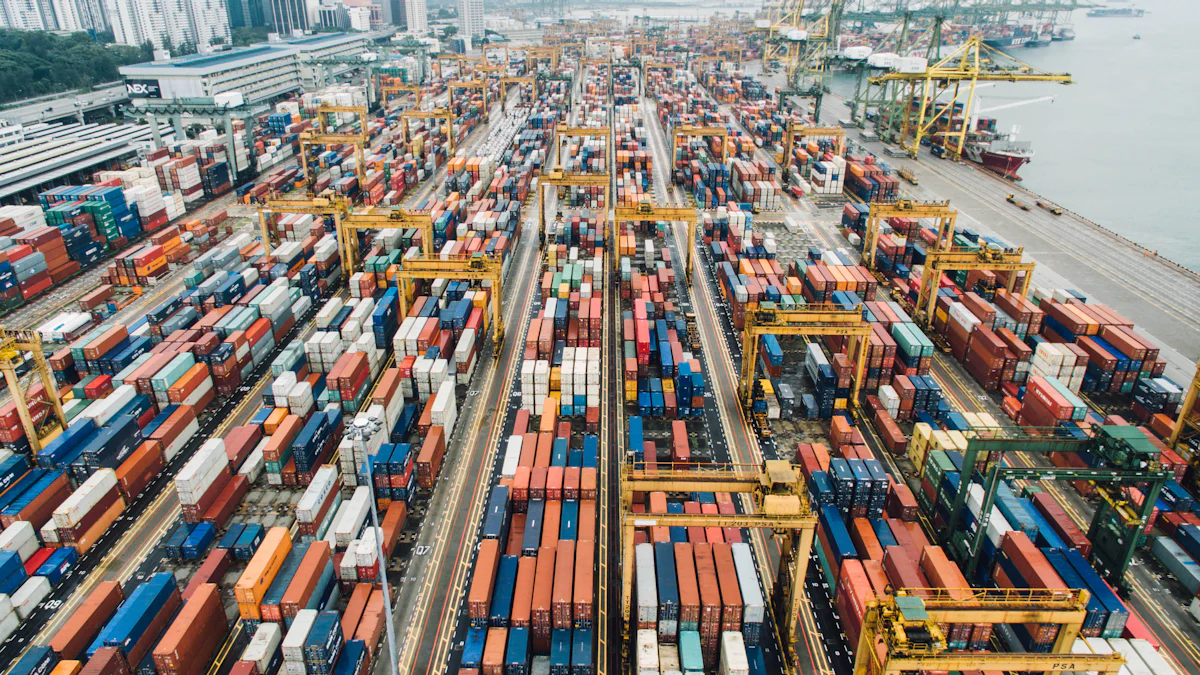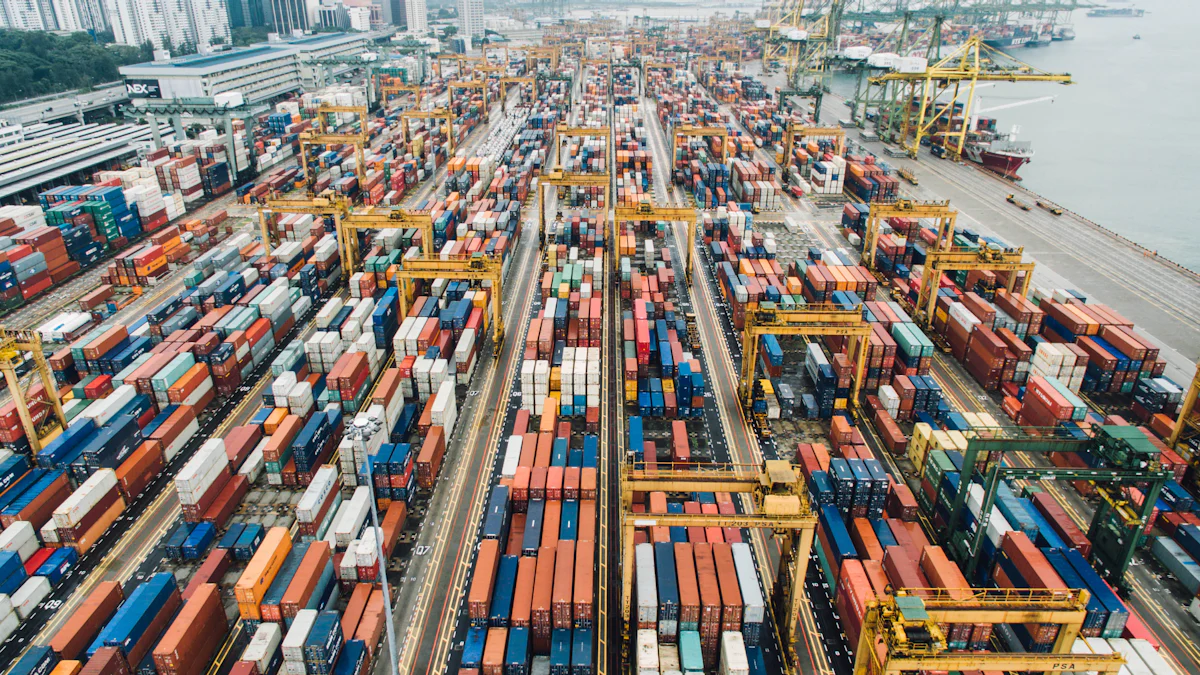Revolutionizing Manufacturing: How Intelligent Supply Chains Boost Efficiency and Profitability

Intelligent supply chains revolutionize the manufacturing industry by leveraging advanced technologies. These systems optimize operations, leading to significant improvements in efficiency and cost savings. For instance, companies using intelligent supply chain planning achieve a 20% reduction in forecast errors. Technological advancements such as AI and machine learning drive this transformation. These tools enable better demand forecasting and faster decision-making. Organizations implementing these systems report a 25% reduction in order-to-delivery lead times. Ultimately, intelligent supply chains enhance productivity and provide a competitive edge.
The Role of Technology in Intelligent Supply Chains

Data Analytics and Big Data
Predictive Analytics for Demand Forecasting
Predictive analytics plays a crucial role in intelligent supply chains. Companies use data to forecast demand accurately. This approach reduces inventory costs and minimizes stockouts. For example, McKinsey reports a 20% reduction in forecast errors with predictive analytics. Businesses can plan production schedules more effectively. This leads to smoother operations and better resource allocation.
Real-time Data Monitoring and Decision Making
Real-time data monitoring enhances decision-making processes. Intelligent supply chains rely on up-to-date information. This allows for quick responses to market changes. Companies like Medtronic have integrated real-time supply chain intelligence. This integration improves efficiency and sustainability. Real-time data helps identify bottlenecks and optimize workflows.
Internet of Things (IoT)
IoT-enabled Asset Tracking
IoT technology enables precise asset tracking. Sensors monitor the location and condition of goods. This visibility reduces losses and ensures timely deliveries. Siemens uses IoT for enhanced supply chain management. The company tracks assets in real-time, improving operational efficiency. IoT-enabled tracking also helps in maintaining product quality during transit.
Smart Warehousing Solutions
Smart warehousing solutions revolutionize storage management. IoT devices automate inventory tracking and control. These systems reduce human error and increase accuracy. Companies like Lenovo implement smart warehousing to streamline operations. Automated systems manage stock levels and reorder supplies as needed. This results in cost savings and improved productivity.
Artificial Intelligence and Machine Learning
AI-driven Process Automation
AI-driven process automation transforms manufacturing processes. Machines perform repetitive tasks with high precision. This reduces labor costs and increases output. AI systems also adapt to changing conditions, ensuring consistent performance. For instance, AI-powered solutions like Supply Chain Intelligence (SCI) enhance logistics and production workflows.
Machine Learning for Quality Control
Machine learning improves quality control in intelligent supply chains. Algorithms detect defects and anomalies in real-time. This ensures high product standards and reduces waste. Companies use computer vision for defect detection, optimizing production performance. Machine learning helps maintain consistency and reliability in manufacturing processes.
Benefits of Intelligent Supply Chains in Manufacturing

Enhanced Operational Efficiency
Streamlined Production Processes
Intelligent supply chains streamline production processes. Advanced technologies like AI and IoT automate repetitive tasks. Automation reduces human error and increases precision. Companies achieve smoother operations and better resource allocation. For example, AI-driven systems optimize production schedules. This leads to higher throughput and reduced cycle times.
Reduced Downtime and Maintenance Costs
Intelligent supply chains reduce downtime and maintenance costs. Predictive maintenance uses data analytics to foresee equipment failures. Early detection prevents unexpected breakdowns. Companies like Siemens use IoT sensors for real-time monitoring. This approach minimizes disruptions and extends machinery lifespan. Reduced downtime translates to higher productivity and cost savings.
Cost Reduction
Optimized Inventory Management
Optimized inventory management is a key benefit of intelligent supply chains. Real-time data provides accurate inventory levels. Companies avoid overstocking and stockouts. This balance reduces holding costs and improves cash flow. McKinsey reports a 15% reduction in inventory holding costs with intelligent planning. Efficient inventory management enhances overall profitability.
Lower Transportation and Logistics Costs
Intelligent supply chains lower transportation and logistics costs. Advanced algorithms optimize routing and scheduling. Companies achieve faster deliveries and lower fuel consumption. IoT-enabled tracking ensures timely shipments and reduces delays. A 20% reduction in transportation costs has been observed with intelligent systems. These savings contribute to a more efficient supply chain.
Improved Customer Satisfaction
Faster Order Fulfillment
Faster order fulfillment enhances customer satisfaction. Intelligent supply chains enable quick responses to market demands. Real-time data and automation accelerate order processing. Companies report a 25% reduction in order-to-delivery lead times. Prompt deliveries improve customer trust and loyalty. Efficient fulfillment processes give businesses a competitive edge.
Higher Product Quality and Consistency
Higher product quality and consistency result from intelligent supply chains. Machine learning algorithms detect defects early in the production process. Quality control becomes more precise and reliable. Companies maintain high standards and reduce waste. Consistent product quality boosts customer confidence. Satisfied customers lead to repeat business and positive reviews.
Future Trends and Outlook
Emerging Technologies
Blockchain for Supply Chain Transparency
Blockchain technology enhances supply chain transparency. Companies use blockchain to create immutable records of transactions. This ensures traceability and accountability throughout the supply chain. For example, blockchain helps track the origin of raw materials. This reduces fraud and increases consumer trust. Organizations like IBM and Walmart have already implemented blockchain solutions. These implementations improve supply chain visibility and efficiency.
Advanced Robotics in Manufacturing
Advanced robotics revolutionizes manufacturing processes. Robots perform repetitive tasks with high precision. This reduces labor costs and increases production speed. Companies use robots for tasks like assembly, welding, and packaging. The integration of robotics leads to higher productivity and lower error rates. By 2026, 75% of large enterprises will adopt smart robots in warehouse operations. This trend highlights the growing importance of automation in supply chains.
Industry Predictions
The Future of Supply Chain Integration
The future of supply chain integration involves increased collaboration. Suppliers, manufacturers, and retailers work together seamlessly. This collaboration enhances efficiency and reduces delays. Digital platforms facilitate real-time communication and data sharing. Companies invest in technologies like AI and machine learning to optimize operations. The integration of intelligent systems creates more resilient supply chains. Businesses gain a competitive edge by adapting to market changes quickly.
Long-term Benefits for the Manufacturing Sector
Intelligent supply chains offer long-term benefits for manufacturing. Companies achieve significant cost savings through automation and optimization. Enhanced transparency reduces risks and improves compliance. Real-time data enables better decision-making and resource allocation. Organizations report improved customer satisfaction due to faster deliveries and higher product quality. The adoption of advanced technologies drives innovation and growth. The manufacturing sector becomes more sustainable and competitive in the global market.
"Intelligent Supply Chain is the cornerstone of the digital economy. By harnessing the power of data and AI, organizations can gain unprecedented visibility, agility, and resilience in their supply chain operations." - Satya Nadella, CEO of Microsoft
Intelligent supply chains play a crucial role in modern manufacturing. These systems streamline processes, increase accuracy, and enhance efficiency. By leveraging advanced technologies, companies optimize inventory levels and reduce costs. Real-world case studies demonstrate significant improvements, such as a 25% reduction in order-to-delivery lead times.
The future of supply chains looks promising with emerging technologies like blockchain and advanced robotics. Industry professionals must embrace these innovations to stay competitive. Adopting intelligent supply chain management will lead to greater profitability and a strategic advantage in the marketplace.
See Also
Key Tactics for High-Tech Manufacturing with JUSDA's Supply Chain Solutions
The Importance of Automated Warehousing in High-Tech Manufacturing
In-Depth Manual on IoT Supply Chain Solutions and Their Advantages
Analyzing Supply Chain Optimization Methods in High-Tech Manufacturing
Best Practices to Enhance Automotive Supply Chain Efficiency | JUSDA Insights
